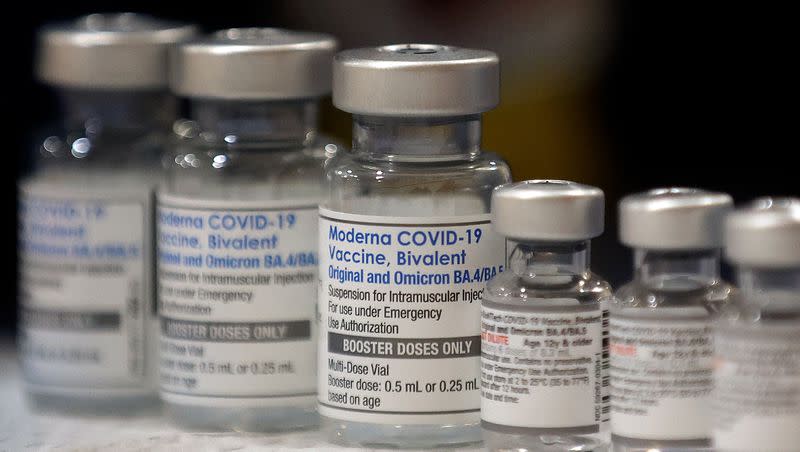Why some people are connecting leprosy in Florida with COVID vaccines

- Oops!Something went wrong.Please try again later.
News that leprosy has emerged in Florida has become a punchline on social media, thanks to Gov. Ron DeSantis being a lightning rod for controversy.
DeSantis : I want Florida to be more biblical.
God: I am sending you leprosy.— Deacon Blues (@DeaconBlues0) August 13, 2023
A headline in Slate even said, apparently seriously, “Don’t Blame DeSantis for an Uptick in Leprosy in Florida.”
But lately, another take has been circulating on X: the idea that cases of Hansen’s disease — the clinical name for leprosy — are somehow connected to the COVID-19 vaccine.
The COVID vaccines have brought back leprosy!
Thank you @DARPA.
Thank you @NIH & FDA.
Great job, everybody. https://t.co/4WON49z7AI— Emerald Robinson ✝️ (@EmeraldRobinson) August 8, 2023
Many of the people posting about this shared an article from The Epoch Times, which The New York Times has called a “leading purveyor of right-wing misinformation.” The headline on the article read, “Growing number of leprosy cases reported after COVID-19 vaccination,” and the newspaper reported that researchers in the U.K. said two cases of leprosy could have been caused by the vaccine. Additionally, the article said, “At least 14 other cases of leprosy or a leprosy reaction within 14 days of COVID-19 vaccination have been reported in the literature, including eight in India.”
Under X’s new policy that allows readers to challenge controversial claims, a follow-up post was added that said, “COVID vaccines do not cause leprosy. The study does NOT show that COVID-19 vaccination causes leprosy, or reduces a person’s immunity and makes it easier to get leprosy. Study participants already had been infected with leprosy months or years before COVID-19 vaccinations.”
The Associated Press issued a fact-checking report that said the claim that leprosy cases were being caused by the vaccine was false and the result of a misinterpretation of scientific papers.
However, the AP said, “Some researchers have explored whether the vaccines could prompt an immune response that causes complications or prompts the disease to surface in people already infected, though even that association isn’t clear.”
It’s easy to see how people skimming headlines could make that association. Conduct an internet search for “leprosy” and “COVID vaccines” and you’ll find studies that have been published about how the vaccine could affect people who already have Hansen’s disease.
But as journalist Pam Fessler, author of a book about leprosy, “Carville’s Cure,” wrote for Slate, leprosy is a bacterial infection not easily contracted. “In fact, 95% of humans are immune to the disease. While DeSantis can be blamed for many things, leprosy is not one of them. The bacteria grow so slowly that the incubation period can be several years. Any patient diagnosed today was likely infected well before Florida’s governor came on the scene.”
Which means that they were also likely infected before COVID-19 arrived in the U.S. DeSantis became governor in January 2019; the first laboratory-confirmed case of COVID-19 in the U.S. was a year later, according to the Centers for Disease Control and Prevention.
Related
Of course, trust in government health officials eroded throughout the pandemic, so reassurances from government officials aren’t likely to stop people from speculating about vaccines and leprosy on the internet. The word “endemic” sounds alarmingly like “pandemic,” so reports that leprosy may be endemic in Florida can be worrying to people who don’t know all the facts.
And the facts, according to Dr. Robert H. Shmerling, writing for Harvard Health Publishing, are these:
“There have been about 20 cases (of leprosy) per year in Florida since 2015. As is true nationally, this represents an increase from prior years. But some experts speculate that leprosy may be endemic now in central Florida, where about 80% of the state’s cases are diagnosed. Endemic means there are enough sources of infection (such as infected people or animals) in a particular area to allow the disease to spread, even if no new cases are brought in from elsewhere. Since some people with infection have no risk factors for the disease, it’s possible leprosy has become endemic there. But that remains unproven.”
That said, “While risk seems low now, it’s a good idea to keep leprosy in mind if you have unexplained rashes or nerve damage, especially if you live in a place where the disease is common or have had contact with an infected person,” Shmerling wrote.
And keep away from armadillos, no matter how cute they are.
Unlike the COVID-19 vaccine, the link between armadillos and leprosy has been proven, and armadillos are on the move in the southeastern U.S. — including, yes, in Florida.

